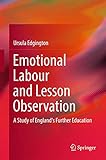Emotional labour and lesson observation : a study of England's further education / Ursula Edgington.
Material type: TextPublication details: Singapore : Springer, (c)2017.Description: 1 online resourceContent type:
TextPublication details: Singapore : Springer, (c)2017.Description: 1 online resourceContent type: - text
- computer
- online resource
- 9789811029912
- 9811029911
- LA637 .E468 2017
- COPYRIGHT NOT covered - Click this link to request copyright permission: https://lib.ciu.edu/copyright-request-form
| Item type | Current library | Collection | Call number | URL | Status | Date due | Barcode | |
|---|---|---|---|---|---|---|---|---|
 Online Book (LOGIN USING YOUR MY CIU LOGIN AND PASSWORD)
Online Book (LOGIN USING YOUR MY CIU LOGIN AND PASSWORD)
|
G. Allen Fleece Library ONLINE | Non-fiction | LA637 (Browse shelf(Opens below)) | Link to resource | Available | ocn964379506 |
Includes bibliographies and index.
Part I -- Chapter 1 Introduction -- Chapter 2 Lesson Observation: Policies and Contexts -- Chapter 3 Theoretical Concepts of Lesson Observation -- Chapter 4 Subjectivity and Objectivity in Observations -- Part II -- Chapter 5 Findings from the Research Study: The Observees -- Chapter 6 Findings from the Research Study: The Observers -- Chapter 7 Conclusions and Recommendations -- Part III -- Chapter 8 Final Thoughts and Looking to the Future.
This book presents research on emotion work and the emotional labour of teaching and learning based in England's further education sector, where an increasing emphasis on marketised systems means accountability and audit cultures have become embedded within everyday teaching practice. Uniquely, this book explores micro-level issues of the managerial policies relating to classroom lesson observations as well as the profoundly emotional, philosophical aspects of these situations, which research asserts cause stress and anxiety for many staff. Drawing on theoretical psychosocial concepts exploring the interplay of hidden or 'underground' micro and macro elements of teaching and learning contexts, the book illuminates how the presence of an observer fundamentally alters the dynamics of a classroom. The author argues that it is not necessarily the performativity that creates the stress and anxiety in an observation but the individual's perception of this performativity and how it relates to a wider consideration of their emotional labour in the classroom. For this reason, the book puts forward a case for ending the formal, graded method of lesson observations in favour of a developmental, holistic approach that is sensitive to the emotional nuances of the individuals involved as well as the social and historical contexts of the institutions in which they are situated. The diverse use of lesson observations as a tool for staff development and quality assurance policies make this a valuable resource for educational researchers, policy-makers, teachers and managers from many different sectors and backgrounds.
COPYRIGHT NOT covered - Click this link to request copyright permission:
There are no comments on this title.
